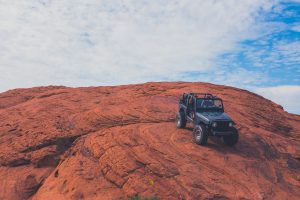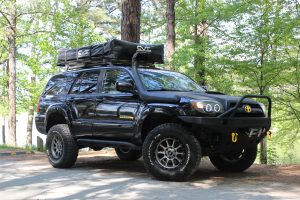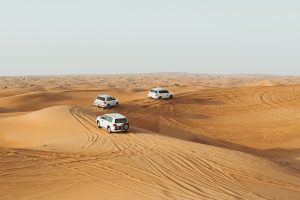
Photo by NeONBRAND
Off-Road Driving is a recreation extreme sport which is driving in natural rough and bumpy terrains such as mud driving, river crossing, sand and rock terrains, ice and snow surfaces in mountains, jungles, Marsh or deserts. Most of the Off-Roaders go for adventure and camping in nature but there are some competitions too. Depend on the route, off-road cars can be very different. A standard 4×4 SUV car can be good for simple off-road terrains but off-roaders usually modify their cars with equipment like Body & Vehicle Lifting, Air Intake Systems (Snorkel), Protection Guards, Winch, Tow hooks, Suspension, Special Tires and …. Sometimes equipment cost much more than the cars itself.

Photo by Patrick Metzger
Some countries put some bans for off-roading because of damages, noise, pollution and environmental impact.
Off-Roading in Vancouver, British Columbia (BC), Canada has various kinds of Terrains from easy trail like Red Rooster in the north of Penticton to difficult one like Eagle Run in the north of Coquitlam.
Some things you may need to have on a trip depends on the trip, location, weather and duration but for instance some of them are proper boots, base layer, pants, waterproof pants, mid layer, jacket, waterproof jacket with hood, extra socks, Bandana, gloves, sun hat, warm hat, map, compass, GPS, Head Lamp, Flash light, cell phone, extra batteries, backup battery, Inverter, In-Car Fridge, first aid kit, sun glasses, knife or multi tools, lighter and matches, extra gas, sunscreen, lip balm, Bug Spray, duct tape, toilet paper, towel, food, water, extra food, extra water, energy food, rope, sleeping bag, underlay, tent, Tire repair kit, Air Compressor, Spare Lamps, Shovel, Ax, Tools, Hi-Lift Jack, Rails, Engine Belts, Spare tires, Fuses, Radiator Hose, Hose Clamps, Tow straps, shackles, chain, Fire extinguisher, Engine oil, Transmission fluid, Brake fluid, Hydraulic-clutch fluid, Cash, …
Safety Tips:
- Fill up your gas tank and check your truck mechanical condition, oils & fluids, lights, …
- Do not drive impaired by alcohol or drugs
- Drive within your ability and keep your speed limit
- If you doubt a terrain for mud or holes or etc. walk it first
- Never travel alone and tell somebody where you are headed before you go
- Never drive on mud or ice that is near moving water or that has recently refrozen or weak or unfamiliar frozen lakes
- Double Check your equipment and packs before heading out
- Before any trip write down the things you need and double check before packing.
- Get information about weather at the time of your trip and update it regularly.
- If anything goes wrong turn around, being alive and healthy will let you attempt later.
- Never go far from the main route so in emergency situation rescue team can find you easily.
- Always get information about the shelters on your trip.
- Invest well for the gears, they may save your life.
- Never go to a new terrain without a guide. Usually, local guides are better because they know of the area and weather region.

Photo by Oskars Sylwan
Useful Links:

